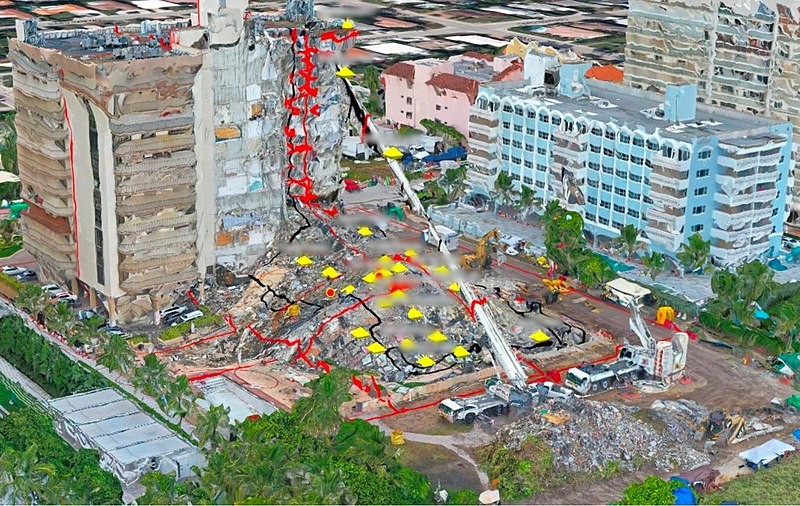Surfside Towers Collapse Causes Tighter Maintenance and Capital Reserve Requirements for Associations

It has been about half a year since the terrible collapse of Champlain Tower South in Surfside, Florida. Because of this tragedy, condominium and homeowners’ association boards and owners have been concerned about the structural safety of their buildings. And now Associations are facing hard questions from mortgage companies concerning both maintenance and capital reserve balances.
Role of Fannie and Freddie in Mortgage Lending
Fannie Mae and Freddie Mac are two governmental entities that guarantee mortgage loans for residential properties, like condominiums and homeowners’ associations. They put out guidelines – requirements for association budgets, documents and practices – that a community needs to meet for Freddie Mac or Fannie Mae to back a mortgage.
If a community does not meet those guidelines, Fannie and Freddie will not back those mortgages. That makes banks reluctant to make the mortgages on the condominium units. In some cases, a bank will not make a loan to purchase or refinance a condominium or homeowners’ association unit if Fannie or Freddie does not guarantee the loan.
This is a long way of saying that if a community does not meet the Fannie or Freddie guidelines, it is hard for anyone to buy or refinance a condominium unit.
New Freddie Mac Guidelines
In December 2021, Freddie issued new guidelines that are directly the result of the Surfside Towers collapse. These guidelines apply to mortgages with settlement dates after February 22, 2022. I have seen some of the questions from the Guidelines already pop up in the mortgage questionnaires that are sent to Association property managers. (Here is a link to the Freddie additional mortgage questionnaire.)
Note: The Guidelines only apply to Communities where there are five or more connected Units.
The Guidelines say that a property in need of “Critical Repairs” is ineligible for Freddie backing.
Critical Repairs is defined as:
Repairs and replacements that significantly impact the safety, soundness, structural integrity or habitability of the project’s building(s) and/or that impact unit values, financial viability or marketability of the project. These repairs and replacements include:
- All life safety hazards
- Violations of any federal, State or local law, ordinance or code relating to zoning, subdivision and use, building, housing accessibility, health matters or fire safety
- Material Deficiencies
- Significant Deferred Maintenance
The Guidance also defines “Material Deficiencies” and “Significant Deferred Maintenance.”
Material Deficiencies are:
Unresolved problems that cannot reasonably be addressed by normal operation or routine maintenance and which include:
- Deficiencies which, if left uncorrected, have the potential to result in or contribute to critical element or system failure within one year
- Deficiencies that will likely result in a significant escalation of remedial cost related to any material building components that are approaching, have reached or exceeded their typical expected useful life or whose remaining useful life should not be relied upon in view of actual or effective age, abuse, excessive wear and tear, poor maintenance and exposure to the elements
- Any mold, water intrusions or potentially damaging leaks to the project’s building(s)
Significant Deferred Maintenance is:
The postponement of normal maintenance, which cannot reasonably be resolved by normal operations or routine maintenance and which may result in any of the following:
- Advanced physical deterioration
- Lack of full operation or efficiency
- Increased operating costs
- Decline in property value
Capital Reserve Requirements
The Guidelines say that Freddie is not changing the Capital Reserve requirements for associations. Freddie requires that an Association either
(A) set aside at least 10% of the budget for Capital Reserves; or
(B) if setting aside less than 10%, have a current Reserve Study that justifies the amount.
If an Association relies on a Reserve Study, however, Freddie sets out a few requirements. The Reserve Study must be dated within the last three years. It must be prepared by an independent expert (like a certified reserve study specialist). Most importantly, the Association needs to follow what is in the Reserve Study. That is, the Association’s funding plan has to meet or exceed the Reserve Study recommendations.
There are plenty of Boards that get a reserve study and get sticker shock at how much money they are supposed to be setting aside for capital reserves. Then they choose to create some sort of “hybrid” funding plan (which is my nice way of saying, “ignore the study they just paid thousands of dollars for”).
A Closer Look at the Guidelines and Questionnaires
The definitions of Critical Repairs, Material Deficiencies and Significant Deferred Maintenance can include a lot of things that even well-managed Associations face. For example, all of these items are “Critical Repairs”
- Roofs that are unlikely to last to their expected (on paper) useful life because of excessive weathering or wear and tear.
- Any water intrusions or mold.
- Scheduled repairs that materially impact the values of the Units.
- The postponement of routine maintenance that increases operating costs, such as not caulking around windows and doors.
- Postponement of routine maintenance that reduces property values.
These Guidelines are aimed at making sure the steel and concrete that hold up high-rises are being maintained properly so that another Surfside does not happen. But the way these items are defined now will include even more issues than most people will think of:
- Communities with stucco problems
- leaking roofs
- crumbling chimney enclosures
- failing stormwater systems that allow rain into foundations
- and all sorts of similar problems.
Practically, all of these items are problems that Associations need to solve eventually. However, the new Guidelines will require Associations to solve them immediately, before they affect the safety or value of Units.
